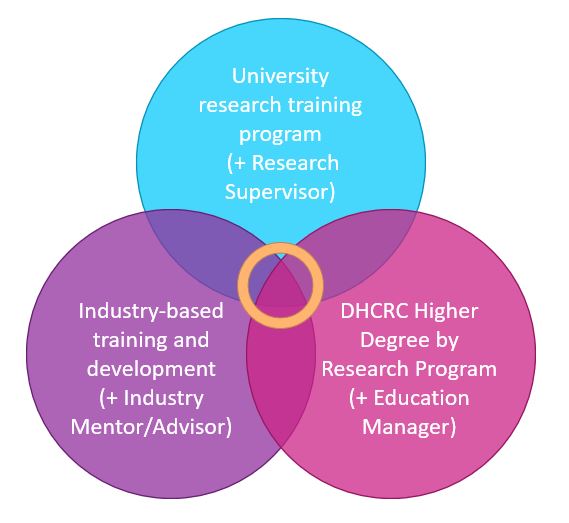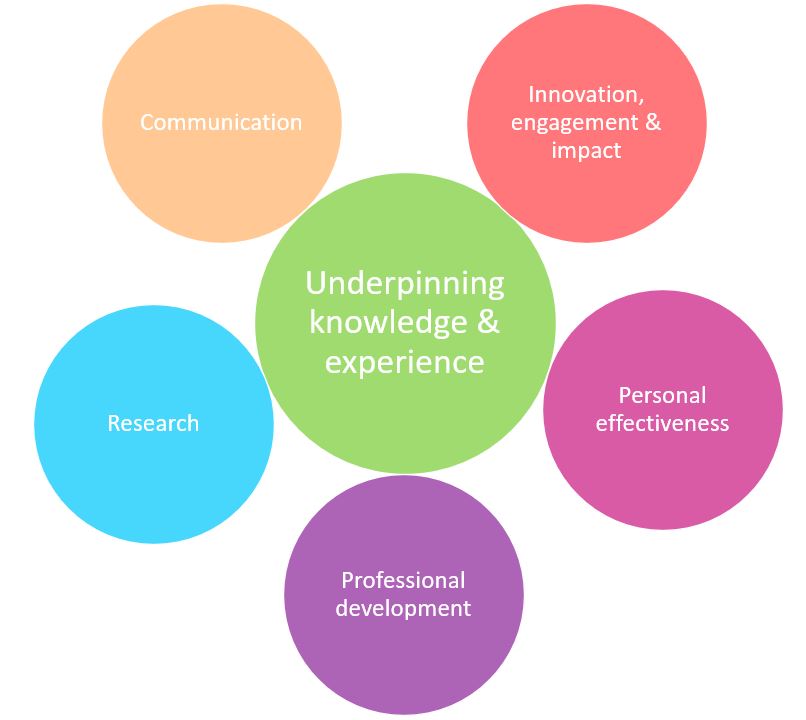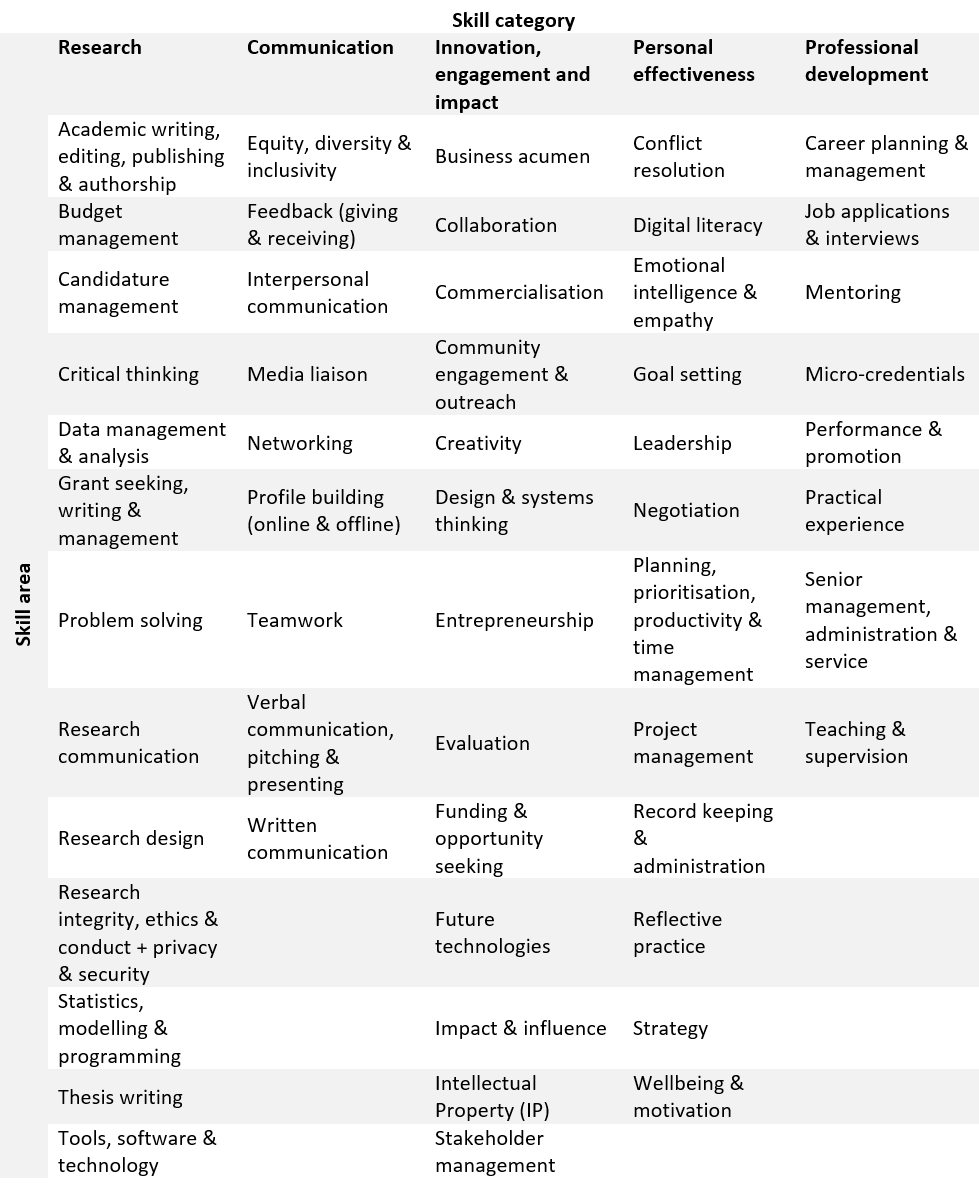DHCRC Higher Degree by Research (HDR) Program
The strength of the DHCRC HDR education program is in its collective power.
Together your university, industry sponsor and DHCRC will provide you with a unique and innovative educational experience and access to the best brains in the business.
As part of your PhD or research masters degree, you will:
- Engage in skill development opportunities from three different partners; DHCRC, your university and industry sponsor, and
- Benefit from the guidance of three domain experts: your Research Supervisor, an Industry Mentor/Advisor and our DHCRC Education Manager.
As a result of this unique training and support model, you will not just graduate with a research degree ⏤ you will emerge as a well-rounded, industry-savvy, confident, competent, collaborative, research-capable and health workforce-ready individual. These attributes are a result of what we like to call the ‘DHCRC effect’ ⏤ which occurs, as depicted in the diagram (to the right), when the forces of industry, academia and DHCRC combine.

The DHCRC HDR education program: much more than the sum of three parts.

Flower power: a snapshot of the skills categories in the DHCRC industry-researcher development matrix.
The DHCRC industry-researcher development matrix
At DHCRC we recognise that you have forged your own distinctive pathway to your PhD or research masters degree and bring with you a unique combination of knowledge and experience.
Throughout your degree you will be supported to build on this base and develop:
- Discipline specific skills and subject knowledge (predominantly through your Research Supervisor and university faculty or department with support from the DHCRC community)
- Industry-relevant skills and specialist knowledge related to your project (primarily via your Industry Advisor/Mentor with support from the DHCRC community)
- Transferrable and professional skills (mainly through the research training area of your university, from practical experience during your industry placement and support from the DHCRC community).
Developing these three types of skills will help you meet your candidature milestones, submit your thesis on time and achieve your impact goals. In addition to degree completion, skill development is also important for career progression, personal development and employability.
The matrix
To assist you to upskill, DHCRC has developed an easy-to-use matrix (see table below) to guide your skills development.
We recognise that through your university and/or industry sponsor you are likely to already have access to detailed skills frameworks that underpin your training and development activities. Our aim is not to duplicate these but instead complement them. Our matrix aims to fit broadly within other frameworks and its primary purpose is to highlight key skill categories and areas (including knowledge, behaviours and attributes) that may be relevant to you during your HDR degree, industry placement and beyond. If you don’t have access to a framework, we suggest you use the Vitae Researcher Development Framework as a reference.
With assistance from your Research Supervisor, Industry Advisor/Mentor and our DHCRC Education Manager, you will use this matrix to complete a skills audit and develop a personalised Professional Development Plan (PDP), which will help you identify skills gaps and training needs. This will allow you to select relevant and timely development opportunities from your university, industry sponsor, DHCRC and beyond.
The Professional Development Plan
The Professional Development Plan (PDP) is the ‘golden thread’ and will be the cornerstone of your success. You and your research are unique and so are your goals and aspirations. That’s why a prescriptive, one-size-fits-all approach is not the best way for us to support you.
To help you bring all the key elements of your research, industry placement and career together, you will be supported by a coach through regular online (and occasional face-to-face) contact. These one-to-one sessions will focus on improving your skills, performance or work-related development, and aim to support you in your current circumstances or challenges, the broader context of your career, and with personal goals and aspirations. In contrast to researcher development group training and workshops, which tend to be pitched at the ‘average’ level of knowledge and common situations, coaching has the advantage of being more targeted and tailored to your individual needs.
Through diagnostic listening and questioning skills, the coach will assist you with competencies like self-awareness, provide you with objective feedback and work collaboratively with you to design personalised strategies and approaches. This will empower you to draw your own conclusions and make your own decisions, ultimately fast-tracking your progress towards your professional and personal goals.
The fine print! You will have noticed that keeping your PDP up to date is a compulsory DHCRC scholarship requirement. Every six months you are expected to review and revise it with your Research Supervisor and Industry Advisor/Mentor and discuss it with your coach. Our DHCRC Education Manager will also advise and assist you. We hope you don’t view this as simply ‘another administrative burden’. We know this tool will help you invest your time more wisely and keep you on track to meet your goals.
Industry-researcher development matrix: key skill categories and areas (including knowledge, behaviours and attributes)



















